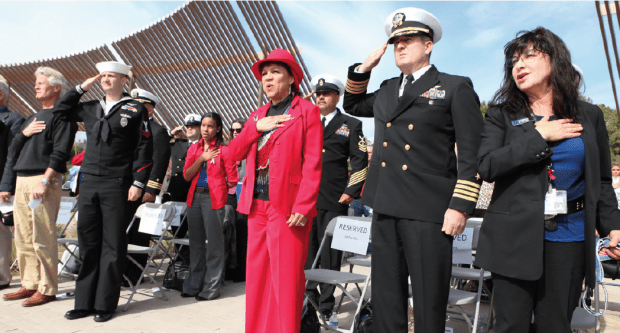The 13th Annual Malibu Veterans Day ceremony is planned for Sunday, Nov. 11 at Legacy Park, and it promises to be the best one yet. In addition to a roster of six to eight veterans speaking and an expected crowd of 300, this year’s celebration will include a flyover of two aircrafts at the start of the national anthem.
Ani Dermenjian, who has organized the event since its inception, said she was “very excited” about the aerial display.
“The flyover is something we’ve wanted every year and this year we’re actually going to have it, weather permitting,” Dermenjian said.
But as Malibu and other cities around the nation celebrate this Veterans Day, a holiday to honor veterans of the armed services which dates back to 1938, the plight of thousands of returning soldiers from conflicts in the Middle East is assuring that concern for veterans is not a hollow issue.
About 2.6 million service members have served Iraq and Afghanistan, approximately 2 million of whom have returned home. It is estimated that between 13 and 20 percent of those 2.6 million have experienced symptoms of post-traumatic stress disorder (PTSD), according to the nonprofit Institute of Medicine. Just over half of Iraq and Afghanistan veterans eligible for VA care have used it so far. More than 177,000 have hearing loss, and more than 350,000 report tinnitus—noise or ringing in the ears. More than 400,000 of these new veterans have been treated by the VA for mental health problems, the most common of which is PTSD.
Moreover, since 2000, the Pentagon reports that 244,000 members of the armed forces suffered traumatic brain injuries or TBI—mostly mild concussions from bomb blasts—the long-term effects of which are unclear. A recent study by the Centers for Disease Control and Prevention found that veterans between the ages of 25-64 had double the rate of heart disease, diabetes, hypertension and cancer as non-veterans. The same study showed troubling signs that young veterans in their 20s and 30s are experiencing slowed metabolism, obesity and other health problems characteristic of people twice their age.
The health issues only add to the challenges veterans face along with other Americans in a struggling economy. An estimated 218,000 veterans of the Iraq and Afghanistan wars were jobless in the second quarter of 2012, according to the U.S. Bureau of Labor Statistics. The national veterans suicide crisis line gets an average of 17,000 calls a day, and the suicide rate for all U.S. veterans is more than 500 per month.
Many organizations have sprung up in recent years to help returning soldiers cope with the transition back into civilian life.
One such local group is Operation Mend, a program at the Ronald Reagan UCLA Medical Center which provides reconstructive surgery for soldiers who have sustained severe facial injures.
“It’s a great caregiver burden,” said Operation Mend Clinical Nurse Specialist Patti Taylor. “It is very difficult to keep the family unit together. If you have a hook as a hand, you will need your wife to take care of you for the rest of your life.”
Operation Mend currently treats a total of 72 patients from all branches of the military service wounded in Iraq and Afghanistan.
“We have a very unique population fighting this war,” Taylor said. “A very young generation who was born in the 80s. They have been fighting for 12 years now, the longest war in the history of this country. One percent of the whole nation is fighting this war.”
The general public has differing opinions towards war, and the primary difficulty that veterans face is acceptance for what they have done, Taylor said. “Some people don’t believe in war and, wounded or not, that can be difficult for veterans.”
“We have visible and invisible injuries of war,” Taylor said. “They may recover, but they don’t have the function life they used to, so they are living with chronic sorrow. Always grieving for what they used to be, not what they are now.”
Veterans are committing suicide at a very high rate. “One in every 18 minutes,” Taylor said.
Another organization that reaches out to veterans and their families is Operation Interdependence, a nonprofit organization that began out of Marine Corps Base Camp Pendleton in 2001. It provides a means for community members to support troops serving on the frontlines, military families and veterans. The local Malibu Chapter grew out of a home in West Malibu.
“It started off as potlucks and with a few people writing letters to see what we can do,” said Mari Stanley, an Operation Interdependence volunteer.
It now has more than 300 volunteers and collaborates with other organizations. Stanley and others helped knit a “Quilt of Valor” which was presented to Taylor and Operation Mend at this year’s Chili Cook-Off.
It took two months to complete the quilt, which now hangs in the family waiting area at the Mend facility.
“It had me crying,” Stanley said. “I didn’t know it was going to turn out that well. It was an honor to be a part of it.”
For more information about Operation Mend, visit operationmend.ucla.edu. Check out www.oidelivers.org for more information on Operation Interdependence.

